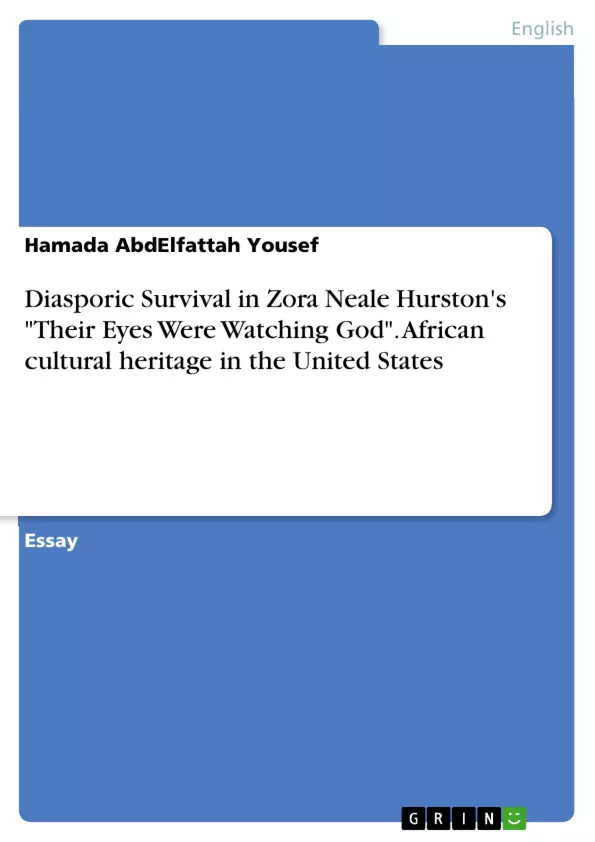In this paper, Zora Neale Hurston’s novel "Their Eyes Were Watching God" is examined to demonstrate how storytelling and the blues, as aspects of diasporic survival, function in her fiction which depicts how African cultural heritage operates in the United States. She articulates the need for her black folks throughout diaspora to confront racism by employing their African cultural heritage as a vehicle for empowerment. Janie, Hurston’s protagonist, finds that when she embraces her African heritage not only does she gain great awareness of her selfhood better as African American, but she also discovers that her Africanity and her identity are intertwined.
Inhaltsverzeichnis (Table of Contents)
- Abstract
- Zora Neale Hurston (1891-1960)
- Storytelling and the Black Self
- Janie's Search for Identity
- The Blues and the African Oral Tradition
- Key Words: African Cultural Heritage, Diaspora, Storytelling, the Blues, and Afro-American Vernacular
Zielsetzung und Themenschwerpunkte (Objectives and Key Themes)
This paper analyzes Zora Neale Hurston's novel Their Eyes Were Watching God to demonstrate how storytelling and the blues, as aspects of diasporic survival, function in her fiction. It explores how African cultural heritage is depicted within the context of the United States, particularly how Hurston utilizes this heritage as a vehicle for empowerment in the face of racism. The analysis reveals how the protagonist, Janie, finds self-affirmation and a deeper understanding of her identity as an African American through embracing her African heritage.
- The role of storytelling and the blues as tools for diasporic survival
- The significance of African cultural heritage in the black experience in the United States
- Janie's journey of self-discovery and the intertwining of her Africanity and identity
- The challenges of racism and alienation faced by African Americans in the early 20th century
- The importance of oral tradition and historical memory in African American culture
Zusammenfassung der Kapitel (Chapter Summaries)
The novel Their Eyes Were Watching God opens with Janie returning to her hometown of Eatonville, Florida, and reflecting on her life journey. Her grandmother, Nanny, a former slave, plays a significant role in shaping Janie's early experiences and instills in her a deep understanding of the hardships faced by African Americans in a racist society. Nanny's own story of survival and resilience during slavery, recounted to Janie, highlights the enduring impact of the past on present-day African American lives.
The novel follows Janie's search for love and self-discovery as she enters adulthood and experiences various relationships. Through her encounters with different men, Janie grapples with societal expectations and the complexities of navigating love and marriage in a society where black women's experiences are often marginalized.
Janie's journey involves the exploration of her African heritage and the significance of her connection to her community. The text emphasizes the importance of storytelling and the blues as cultural expressions that provide resilience and a sense of belonging for African Americans. Hurston uses Janie's experiences to illustrate the power of embracing one's heritage as a means of confronting racism and reclaiming agency.
Schlüsselwörter (Keywords)
The main keywords and focus topics of this novel include African cultural heritage, diaspora, storytelling, the blues, Afro-American vernacular, racism, identity, self-discovery, and oral tradition. Hurston's work delves into the complexities of navigating a racist society while embracing one's heritage and finding a sense of belonging within one's community.
- Quote paper
- Hamada AbdElfattah Yousef (Author), 2012, Diasporic Survival in Zora Neale Hurston's "Their Eyes Were Watching God". African cultural heritage in the United States, Munich, GRIN Verlag, https://www.grin.com/document/1247789



